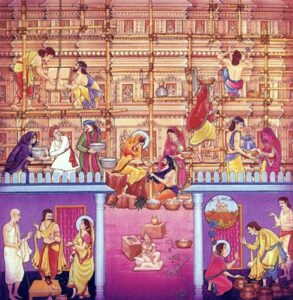Shravika Who Wore Intelligence as her crown and Humbleness as her cape.
As per Jainism, things change as per Dravya (matter), Kshetra (place), Kaal (time) and Bhaav (feelings). Similarly, is it not possible for the concept and definition of empowerment to change over a period of time, the situation and the place?
This is the story of the mighty Shravika, who had incomparable intelligence and munificent personality. Anupama Devi is why India has one of the five world-famous Delwada temples exist.
Daughter of Chandravati village near the foothills of Mt. Abu, Anupama Devi, was married to Tejpal. The younger brother of Vastupal and a famous courtesan of the Veerdhaval, the King of Dholka.
Anupama Devi hardly fitted the beauty standards during those days, one of the major reasons being her dark complexion. This kept Tejpal away from his wife for years. However, her worth in the family was never questioned; her beauty was in her heart and intelligence.
Anupama Devi’s mother-in-law was the first to seek her advice on serious matters, followed by Vastupal and Tejpal. Anupama Devi was usually consulted, whether it was about domestic affairs, politics, or Sangh’s issues.
Were intelligence and generosity the only two qualities that distinguished Anupama Devi from the other Shravikas? Certainly not! She was-
A Leader :
All the qualities that a leader must have been imparted in Anupama naturally. Be it goal setting, the delegation of work, time management, teamwork, or decision making; she knew it all. She was one of the best problem solvers during her time.
Anupama was a master in handling situations. When ghee (butter) accidentally fell from Yati’s hand on her saree, she calmed Tejpal’s anger skillfully. Before he could react to this situation, she said, “Oh! What would be my condition if I had taken birth at a ghee dealer’s home? However, I count myself lucky to get ablution of ghee from guru’s vessels”. Tejpal’s anger vanished when he heard these words.
A boss is a person who orders, but a leader is the one who gets the work done and shares responsibility.
To fulfill the wish of her elder brother-in-law Lunga, she undertook the herculean responsibility of building the intriguing Lungavasahi temple. But how did they select the place to build the temple on Mt. Abu. Thanks to Anupama Devi, who kept the proposal in front of the brothers after seeing the landowner, the land’s acres, its price, and all the other details!
Anupama Devi commenced ekashana when the temple’s construction started till they were finally built. Even while fasting, she managed to care for all the artisans just like a mother.




